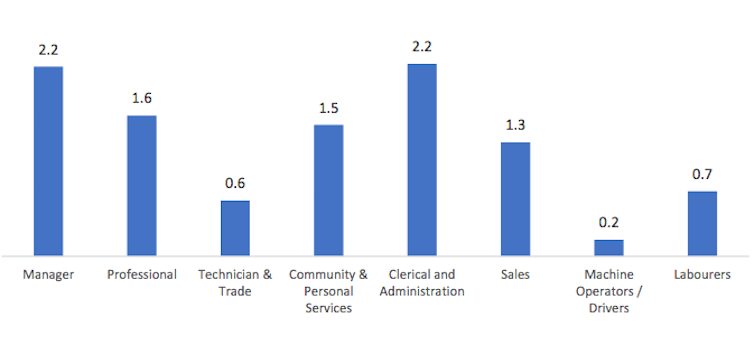[ad_1]
COVID-19 has essentially modified our relationship with the workplace. After the enforced experiment of lockdowns pushing about 40% of the labour power into working from residence, few of us need to return to the pre-pandemic established order.
Sure, we miss the sociability of the office, however surveys present at the very least three-quarters of us need the choice to spend a couple of days working at residence and some days within the workplace.
However what precisely is the suitable stability?
Learn extra:
It is not simply the isolation. Working from residence has shocking downsides
The expertise of working from residence has helped break down lots of the prejudices that restricted work flexibility previous to 2020. However there stay discernible variations in attitudes between staff and managers on this query. As Australia’s Productiveness Fee notes in a September 2021 analysis paper:
There are precise or perceived prices to working from residence, reminiscent of lowered alternatives for collaboration and networking, lowered face-to-face interplay with managers, and penalties for long-term profession prospects.
That final level is of explicit concern. A pre-pandemic research discovered absolutely distant staff, regardless of being 13% extra productive, have been solely half as more likely to be promoted as their colleagues who spent their time within the workplace.
The explanations for this are doubtless complicated – a mixture of specific attitudes and unconscious biases. Their persistence spells hazard for post-COVID organisations. Particularly they might drawback these with carer tasks, who usually tend to need better flexibility.
So what number of days per week within the workplace is sufficient? How can we stability the will of managers to convey individuals along with worker’s need for better flexibility?
Most well-liked variety of days working at residence, by occupation

Institute of Transport and Logistic Research, College of Sydney, CC BY
Legacy administration
Some organisations are adamant that going again to the workplace all or more often than not is crucial. Take, for instance, Google.
The Silicon Valley big has gained awards for its open company tradition. Its merchandise have facilitated as a lot as any firm within the teleworking revolution. However in September Google stated it could cut back the pay of its US staff selecting to do business from home completely.
An organization spokesperson justified this on the grounds Google had all the time paid staff in response to “the native market primarily based on the place an worker works from”. However given the corporate’s lengthy antipathy to distant work it’s arduous to see this as something apart from a stick to drag staff again to the workplace. Selecting to do business from home may reportedly value some staff as much as 25% of their wage.
If that is the perspective at Google, simply think about what prevails in additional conservative managerial cultures. Certainly it’s largely managerial fears which have stymied the potential for better work flexibility since know-how made “teleworking” a risk within the Seventies.
Learn extra:
50 years of daring predictions about distant work: it is not all about know-how
For many years considerations about innovation and productiveness have been cited as causes staff have to be within the workplace more often than not, regardless of analysis indicating there’s no cause we must be within the workplace on daily basis to maximise the advantages of collaboration. The lived expertise of the pandemic has helped mitigate these considerations, however not fully.
These attitudes are arguably related to a “legacy” mannequin of administration – a mannequin during which attitudes have failed to alter together with the information. Bundy clocks and different specific types of command and management could have been deserted however there are nonetheless typically unwritten expectations about things like not leaving earlier than the boss and placing in unpaid time beyond regulation being stipulations to pay rises and promotions.
The true query
So the massive query isn’t actually about what’s the optimum mixture of days within the workplace and at residence. Consultants agree there isn’t a one-size-fits-all mannequin for hybrid work. It ought to actually rely upon the context and people. Possibly it’s 4 days week within the workplace, possibly it’s one.
The query is why managerial attitudes are taking so lengthy to catch as much as actuality.
There’s now in depth analysis displaying that staff are simpler and happy of their jobs once they have the flexibleness to customize their work. This flexibility encompasses not simply whether or not we do business from home or the workplace a sure variety of days, but in addition after we work, who we work with and what we’re engaged on.
After a profession of doing issues just one means, it appears many managers merely don’t know easy methods to handle in another way.
Our organisations are usually not made up of 1 sort of particular person and one sort of job, one thing our administration constructions and organisational initiatives typically ignore. Success within the post-COVID world will rely upon considering in another way and making a tradition that embraces the alternatives this new mannequin of labor brings.
That’s the dialog we have to have – wherever we’re.
[ad_2]

